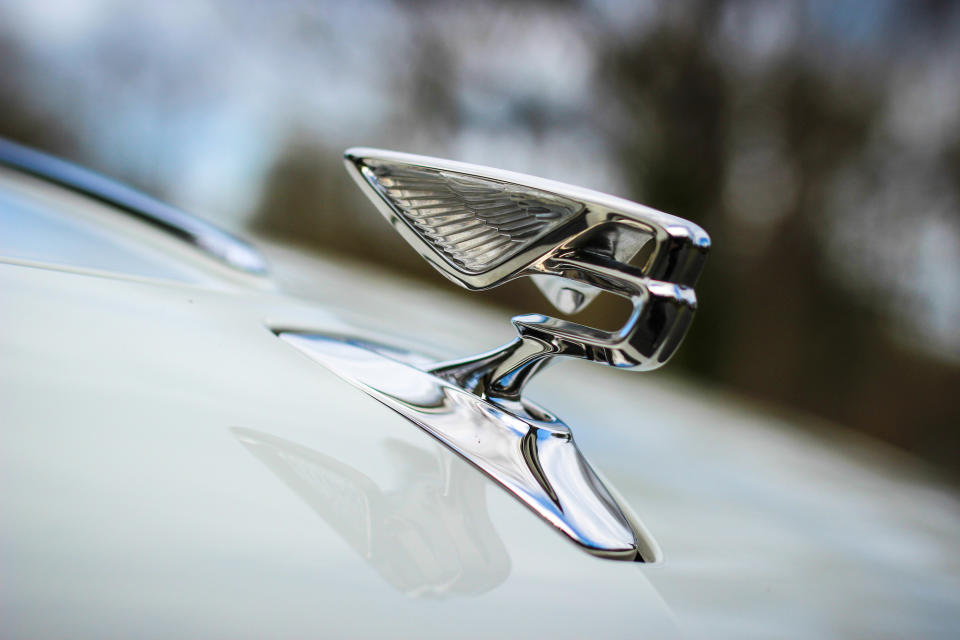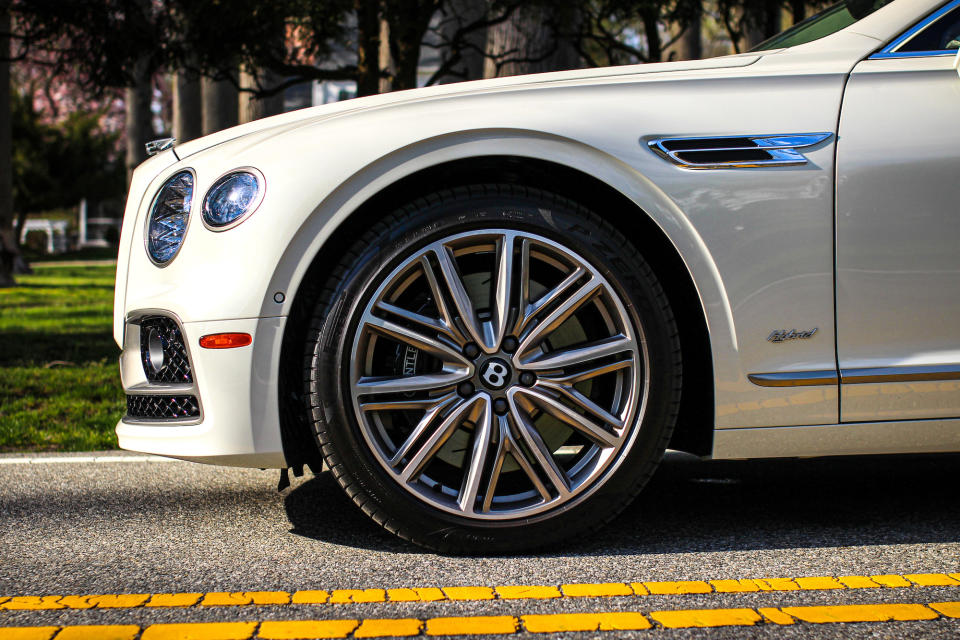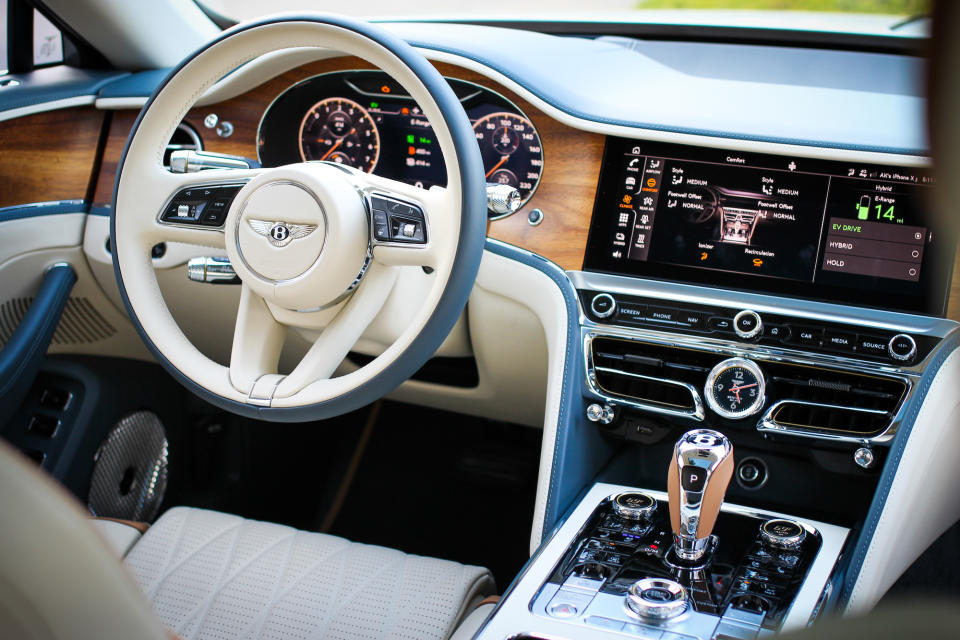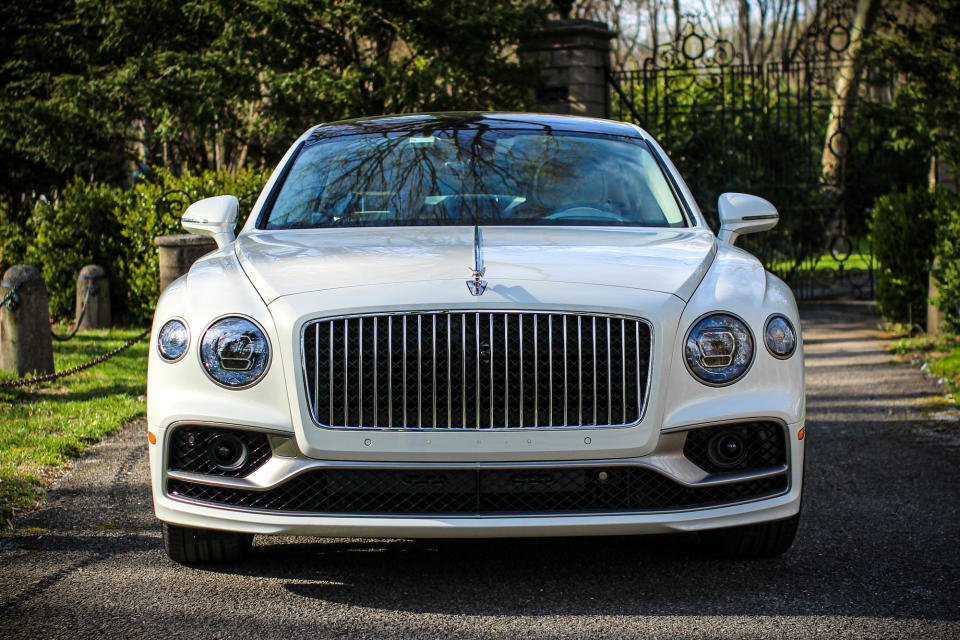The 2022 Bentley Flying Spur Hybrid is a shaky step toward a luxurious EV future
Bentley is engaged in a never-ending battle to balance classic luxury coach-building and modern automobile manufacturing.
The luxury automaker not only has to keep up with changing technology, consumer taste and industry standards, it must also consistently deliver the old world-inspired sophistication for which it's known. The automotive industry's move toward electrification adds another challenge — one Bentley is also taking on with its Beyond 100 initiative to become a fully electric brand by 2030 and electrified versions of all its products on offer by 2023.
Bentley first tested the electrified waters in 2019 with the hybrid version of the Bentayga SUV. Now it's time for the Flying Spur, a full-size luxury sedan that has historically been paired with either a decadent W12 engine or a spirited V8.
The automaker swapped in a V6-centric hybrid powertrain in an effort to prove that a Bentley is more than just a boisterous power plant. The upshot: The Bentley Flying Spur Hybrid is an uncharacteristic bump in the rocky road towards the future.
Nuts and bolts
Image Credits: Alex Kalogianni
Beneath the bonnet of the Bentley Flying Spur Hybrid is the first V6 to be found in a Bentley sedan in 64 years, specifically a 2.9-liter twin-turbo power plant that gins up 410 horsepower on its own. This is paired with a 134-horsepower electric motor that sits between the engine and the 8-speed dual-clutch automatic transmission.
With everything working in unison, the Flying Spur Hybrid boasts an output of 536 horsepower and 553 pound-feet of torque, sending it to all four wheels and leaping from 0 to 60 in 4.1 seconds. This is just a tenth of a second slower than the V8, for those keeping score.
To put this in perspective, the W12 Flying Spur can muster up 626 horsepower and sprint to 60 mph in 3.7 seconds. It can also sail to 207 mph, while the 542-horsepower V8 can top out at 198 mph. The new hybrid is limited to 177 mph. All of this is academic for those who live sans a handy unrestricted stretch of autobahn, but it does collectively paint a picture of a car struggling to meet an established standard, not exceed expectations.
Batteries and modes
Image Credits: Alex Kalogianni
Along with the e-motor, new components include an 18.0-kWh battery and a level 2 J1772 charging port, which Bentley states can be topped up in two and a half hours. It's good for about 21 miles of all-electric cruising and gives the Flying Spur a solid 46 combined MPGe, a far cry from its other, thirstier iterations. The extra port and the "Hybrid" badging are the only things that betray that this Flying Spur differs from any other.
Like other Bentley vehicles, there is a selection of modes that influence driving dynamics, determining the gentleness or sportiness of various systems. With the new hybrid setup, a new, separate set of modes are added for drivers to adjust the behavior of the powertrain: EV Drive, Hybrid and Hold.
The Flying Spur Hybrid puts its best foot forward at start-up, defaulting to EV Drive. It's the quiet, gliding hint of what an all-electric Bentley will feel like once it arrives.
Hybrid mode predictably flicks between systems, depending on driver behavior and conditions, but also through route optimization thanks to a link between this system and the on-board navigation. Punch in a route and the Flying Spur will determine the most efficient segments to use its remaining charge.
Hold mode will limit battery use, though it won't discontinue it altogether. It will primarily utilize the V6, but will engage the e-motor for extra boost. This is also the default setting when in Sport driving mode.
Speaking of driving, some notable sacrifices were made to facilitate all the new hybrid hardware. Rear-wheel steering and a 48-volt anti-roll system can be found on the V8 and W12 Flying Spurs. These systems not only provide more balance and stability for comfortable cruising, but assist in altering the dynamics of the healthy sized sedan when engaged in speedy and sporty jaunts.
Luxury accommodations
Image Credits: Alex Kalogianni
Within the cabin, the tech matches that found in the rest of the Flying Spur lineup, as well as the Continental GT Coupe: a 12.3-inch digital touchscreen that tumbles away when not needed to reveal three analog gauges, an all-digital gauge cluster and a head-up display are all present. They've been updated with additional graphics to monitor battery usage, remaining charge and regeneration, with the gauge cluster specifically updated to show powertrain behavior in real time.
Battery status is one of the many things that can be tracked away from the Flying Spur, thanks to connected car services that link to the car via a smartphone app.
Along with the current charge, the app allows users to schedule charging times and receive charge time estimates. It also logs trip data that includes average fuel consumption, allowing for more informed planning on future journeys. The cabin can also be remotely primed ahead of arrival, so it can be warmed or cooled, depending on the current climate.
What hasn't changed is Bentley's masterful interior craftsmanship. Like an indulgent feast, the Flying Spur is a sensational delight with soft leather seats, open pore Koa wood accents, metal diamond-cut knurled knobs and a laundry list of other intricate details. It's fair to say Bentley has the luxury side of things properly nailed down at this point, though this doesn't yet seem to be the case when it comes to electrification.
The UX
Image Credits: Alex Kalogianni
Defaulting to EV mode upon start-up is a clever showcase of the Flying Spur Hybrid's best attributes. Relatively silent and incredibly gentle, the electrified Bentley feels as if this is what it was meant for all along.
Combine this with the cabin's substantial sound dampening and the experience is almost frightening at times, and it takes a split second for your senses to remember it's all working as intended and that nothing has switched off. Passengers are treated to the sensation of wafting on a quiet, luxurious cloud through town, and though this may be the peak Bentley experience from the rear seats, it's a different story from behind the wheel.
While the temptation of plowing full steam ahead in a W12 version or taking a spirited jaunt with the V8 is ever present, the Flying Spur is a car meant to be driven in comfort for most of its operation. Effortless acceleration, seamless gear shifts and cushiony braking has been the name of the game in that regard, and they've all been altered in this iteration of the Spur.
Image Credits: Alex Kalogianni
Bentley's "Bentley" mode is the automatic catch-all setting that changes depending on the driver's behavior: tread lightly and it will behave in comfort mode, but start getting feisty, and it will switch things over to sport. Generally, these affect the steering tightness, damper rigidity and also the input speeds for throttle and braking. These three settings now have to contend with whichever drivetrain setting a driver wishes to use, and this begins to complicate things.
By default, the throttle has a small input delay that isn't uncommon in luxury-oriented vehicles to mitigate jerky hops forward. It works fine in E-mode when at low speeds, but operating solely on the electric motor has its limitations. Any desire to really get a move on requires the activation of the V6.
In fact, trying to customize only the throttle response necessitates sport mode. All of this effectively breaks the spell the all-electric mode has cast. Traditionally, this is where the satisfactory grunt of either of the other engines declares its presence, ready for duty, but the V6 doesn't come to life in hardly the same way. The additional sound baffling further diminishes it in a disappointing way.
Apart from the sound, the Flying Spur is seamless when it flips from battery to engine power, and once it's up to speed, it coasts unmistakably as a Bentley. Once it's time to slow things down, the newly implemented regenerative braking gives the Flying Spur a strange "hop" right at the end, making it difficult to finesse a smooth halt. All told, from start to finish, the core luxury experience is compromised by the inclusion of the hybrid system.
Things are more familiar in sport mode. With the V6 always engaged, most of the new quirks are diminished. Braking still suffers, but throttle and steering are as sharp as ever. The extra battery juice makes up for the smaller engine's shortcomings, though it's preciously finite, and it takes a long time in "hold" to recoup a mile's worth of range. Losing the rear steering doesn't sting so much as the loss of the anti-roll system does, which certainly helped mitigate the Flying Spur's heft in the past when taking it around corners.
Image Credits: Alex Kalogianni
Take all of the above with a very refined grain of salt. We're still talking about a Bentley here, and it still does everything in a comparatively stellar fashion relative to most vehicles out there. But when stacking it against other Bentleys, the Flying Spur Hybrid stumbles a bit too often to be top of the line.
The Bentley Flying Spur Hybrid sets itself apart from its other iterations by being the most fuel efficient version literally by miles. Its 21-or-so miles of electric range isn't much on its own but paired with the V6, it can go the distance, so long as it's kept regularly charged at home. Bentley is kind enough to throw in a charging unit with the roughly $210,000 purchase, so buyers don't need not deign to visit the local community charging station.
Compromising the performance of the Flying Spur's luxury characteristics feels like a necessary growing pain in light of Bentley's greater mission.
In context, this will feel like an important step to reach the promises of full electric luxury. In the present, the Bentley Flying Spur Hybrid fumbles between doing what it does best and what it's doing for the first time, resulting in a rare Bentley that falters in its execution. This car's all-electric mode is a tantalizing morsel of what's to come, it's just a shame that the taste is so fleeting.








